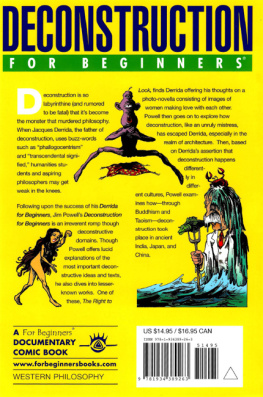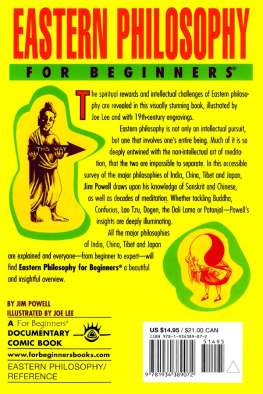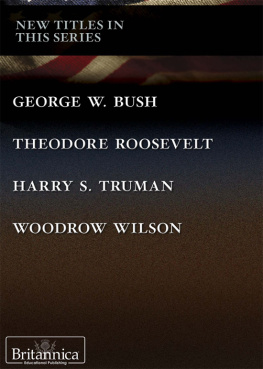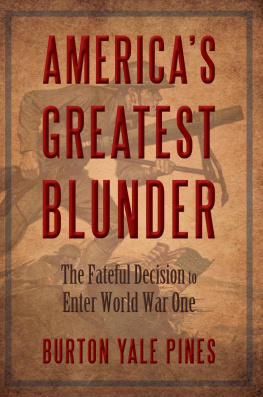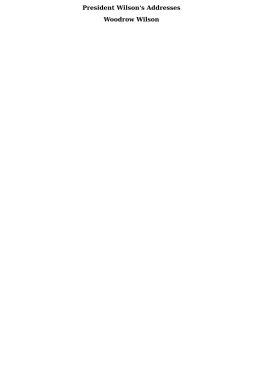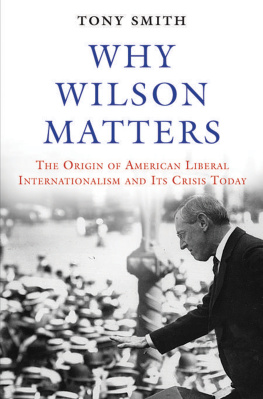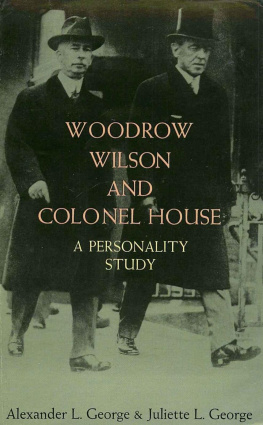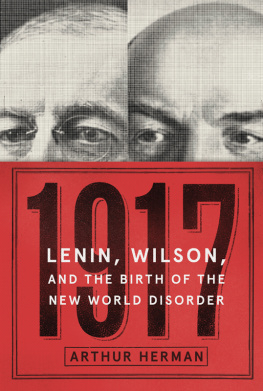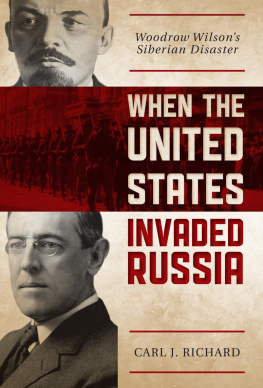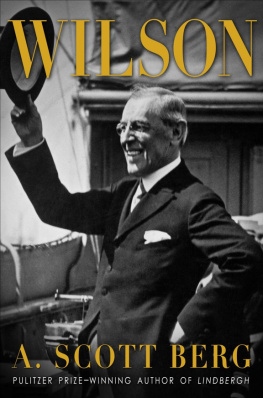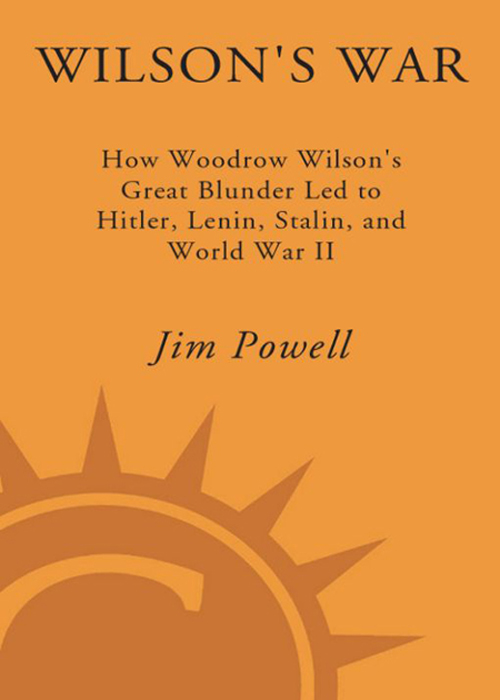
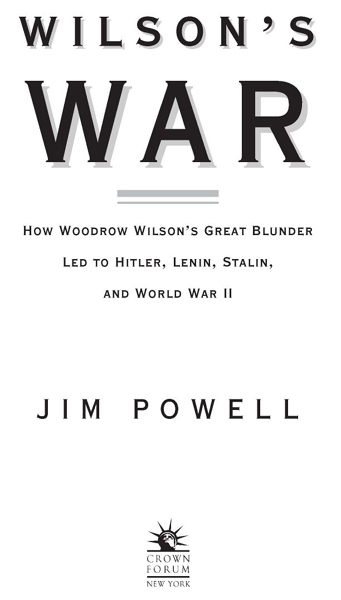
Table of Contents
To Madeline, Frank, Marisa, Justin, Kristin, and Rosalynd
INTRODUCTION
ARROGANCE AND POWER
PRESIDENT WOODROW WILSON, according to the conventional view, was a great progressive, a president who showed how the United States can do good by intervening in the affairs of other nations.
I am in complete sympathy with Wilsons broad program and with his vision for the future, wrote diplomatic historian Thomas A. Bailey. He spoke with unchallengeable realism when he said that isolationism had been repealed by the forces of history; he spoke with prophetic vision when he said that if we did not set up an agency to prevent war, another and more terrible holocaust would engulf the next generation. 1 Arthur S. Link, long a guardian of Wilsons reputation, credited him with helping to lay the foundations of a new world order. 2
The conventional view must be challenged, because Wilson made a decision that led to tens of millions of deaths. Far from helping make the world safe for democracy, as he claimed, he contributed to the rise of some of the most murderous dictators who ever lived. No other U.S. president has had a handhowever unintentionalin so much destruction. Wilson surely ranks as the worst president in American history.
Wilsons fateful decision was for the United States to enter World War I. This had horrifying consequences.
First, American entry enabled the Alliesprincipally Britain and Franceto win a decisive victory and dictate harsh surrender terms on the losers, principally Germany.
Until the United States entered the war, which had begun in August 1914, it was stalemated. The British and French together always had more soldiers on the Western Front than the Germans, but the Germans had smarter generals and more guns.3 The British navy maintained a blockade that prevented the Germans from importing just about anything, including food, and the Germans had no way to invade England. Both sides suffered millions of fatalities, and their fighting forces were weary. Neither side had the capacity to dictate harsh terms to the other.
After two years of war, there was increasing support for peace on both sides. In Russia, as early as the summer of 1915, there were widespread protests against the war.4 Wilson repeatedly offered his services as a mediator for peace, but as historian Barbara Tuchman noted, The talk exasperated the Allies. It was not mediation they wanted from America but her great, untapped strength.5 In December 1916, the Germans proposed peace talks, but they wanted to retain the French and Belgian territory they occupied, and the idea was rejected; the British and French anticipated that the United States would enter the war and enable them to win a decisive victory that would avoid compromise with the Germans. Politicians on both sides knew they would be toppled if they couldnt brag about territorial gains and if it became obvious that millions of people had died for nothing. In February 1917, the Hapsburg emperor Karl I pursued peace negotiations with the British and French, aimed at getting Austria-Hungary out of the war even if their ally Germany continued fighting, but Italy objected. If the United States had stayed out, the British and French would have been under more pressure to compromise. There probably would have been a negotiated settlement.
American entry in the war undermined efforts to develop a viable German republic. German generals Paul von Hindenburg and Erich von Ludendorff, who controlled the military and the government, recognized that the individual who carried out the surrenderby signing the armistice agreementwould be hated. They resigned, and the king, Kaiser Wilhelm II, abdicated. These men didnt want their fingerprints on the Armistice. A republic was declared on November 9, and the thankless task of signing the Armistice fell to Matthias Erzberger, a civilian and leader of the Catholic Centre Party, who had spoken out for peace. The humiliating list of surrender terms included a shocker: the British naval blockade would continue indefinitely even though the German soldiers had stopped fighting, and German children were starving to death. The newborn German republic, not the military, was discredited by the Armistice. Erzberger was later murdered as one of the November criminals.
Having enabled the French and British to win the war, Wilson imagined that he could persuade them to agree on a peace settlement according to the high-minded principles he outlined in his January 18, 1918, Fourteen Points speech before a joint session of Congress principles including self-determination for peoples, freedom of the seas, and no more secret treaties. But at the Paris Peace Conference, beginning in January 1919, Wilson participated in secret diplomacy from which the Germans were excludedand an old-fashioned scramble among victors for the spoils of war.
Wilson failed to stop French prime minister Georges Clemenceau. Known as the Tiger, Clemenceau was determined to avenge Germanys defeat of France in 1870a war France had startedand the loss of 1.3 million Frenchmen during World War I. Clemenceau got the notorious war guilt clause (Article 231) claiming that Germany was 100 percent responsible for the war, and he made sure the treaty obligated Germany to pay huge reparations and surrender a long list of assets including coal, trucks, guns, and shipsprivate property as well as property of the German government.6
Despite Wilsons professed ideals about self-determination, he didnt stop the Allies from dividing German colonies among themselves. Neither the British nor the French were about to dismantle their colonial empires. The British Empire expanded by taking over the former German colonies of Tanganyika and part of Togoland and the Cameroons. Belgium and South Africa divided the rest of Germanys holdings in Africa. To bribe Italy to enter the war on their side, the British and French had signed the secret Treaty of London (1915), which promised the Italians war spoils in Austria-Hungary, the Balkans, Asia Minor, and elsewhere, and the Italians wanted it all; they were outraged to find that the British and French planned on giving them little.7 The Japanese demanded Chinese territory and a statement affirming racial equality, and while they didnt get those things, they ended up receiving German assets in Chinas Shantung province, including a port, railroads, mines, and submarine cables.8
Maybe the Germans deserved to be treated as they had treated others, but the harsh surrender terms, made possible by American entry in the war and enshrined in the Treaty of Versailles, further discredited the German republic and triggered a dangerous nationalist reaction. Many Germans became convinced that armed force was ultimately the only way to make up for the shame of Versailles. A year after the signing of the Versailles Treaty, former German corporal Adolf Hitler took over the tiny German Workers Party, transformed it into the National Socialist German Workers Party, and began recruiting thousands of members by denouncing the treaty, Jews, and Bolsheviks. As far as Bolsheviks were concerned, one might say that Hitler found one of his most politically useful adversaries thanks to Woodrow Wilson. Among Hitlers early recruits, becoming Nazis in 1922, were Joseph Goebbels, who was to play a vital role orchestrating Nazi propaganda and mass rallies; and Rudolf Hoess, who was to manage the extermination of Jews at Auschwitz.
The reparations bill, which the Allies presented to the Germans in 1921, created powerful incentives for the Germans to inflate their currency and try paying their debts with worthless marks. Reparations werent the only factor in the ruinous runaway inflationthe Germans were trying to maintain a deficit-ridden welfare state, including government-run sausage factories, at the same timebut unquestionably reparations added incentives to inflate. It was no coincidence that the German inflation was worse than any other inflation following World War I. Before the war, marks were being exchanged at the rate of 4.2 per U.S. dollar, and by the end of 1923 the rate was about 4 trillion marks per dollar.9 The inflation wiped out life savings, made a mockery of honest contracts, disrupted production, devastated rich and poor, young and old, men and women.
Next page

